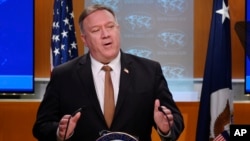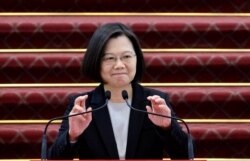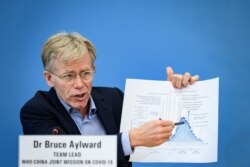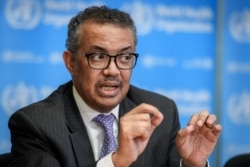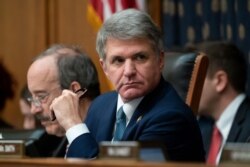The United States is backing Taiwan’s observer status in the World Health Assembly, the decision-making body of the World Health Organization (WHO.)
The support comes at a time when Washington is sounding the alarm on foreign governments’ disinformation campaigns, calling out China as questions rise on China’s influence over the WHO amid the COVID-19 pandemic.
On Monday, U.S. Secretary of State Mike Pompeo said the State Department will “do our best to assist” Taiwan’s “appropriate role” in the world's highest health-policy-setting body.
The U.S. move is seen as an open rebuke to China. The Beijing government has been blocking Taiwan's representation at WHO meetings after the self-ruled democracy elected Tsai Ing-wen, a China skeptic, as Taiwan’s president in 2016 and won the re-election in 2020.
The top U.S. diplomat said the State Department will “fully comply” with the Taiwan Allies International Protection and Enhancement Initiative (TAIPEI) Act of 2019, a bill signed into law by U.S. President Donald Trump on March 26.
“We think it's important. And we were pleased that that piece of legislation made it out of the Congress and onto the president's desk last week,” Pompeo told a group of reporters in a telephonic roundtable Monday.
The U.S. law says “it should be the U.S. policy to advocate, as appropriate, for Taiwan’s membership in all international organizations in which statehood is not a requirement and in which the United States is also a participant, as well as for Taiwan to be granted observer status in other appropriate international organizations.”
The move prompted an immediate objection from China.
"We strongly urge the U.S. to correct its mistake, refrain from implementing this act and obstructing other countries' pursuit of relations with China. Otherwise, it will be met with resolute countermeasures from the Chinese side,” said China’s Foreign Ministry Spokesperson Geng Shuang last Friday.
Delegates from Taiwan had attended the World Health Assembly as nonvoting observers from 2009 to 2016, during a period of relatively warm ties between Beijing and Taipei.
China has since blocked Taiwanese representation at the event as part of its efforts to pressure Tsai. China claims sovereignty over Taiwan, but Tsai rejects the Beijing government’s condition for dialogue that both sides belong under one flag. The two sides have been separately ruled since the 1940s.
The tense relations and Taiwan’s plea to join the WHO as an observer amid the COVID-19 pandemic was highlighted on Twitter in recent days.
“I’m sorry, I couldn’t hear your question,” senior WHO adviser Bruce Aylward told a Radio Television Hong Kong (RTHK) journalist after she asked about Taiwan’s status and Taiwan’s handling of the coronavirus outbreak. Aylward, who helped lead a WHO mission to Wuhan in February, appeared to hang up the video call when she repeated the question.
When the RTHK reporter called back to ask again about Taiwan and its coronavirus measures, Aylward said: “Well, we’ve already talked about China.”
The video went viral, sparking questions on China’s influence over the world’s health body.
“WHO shilling for #China continues. Time to clean house at that organization, which is failing the world before our eyes,” said U.S. Senator Josh Hawley (R-Missouri) in a tweet.
Later in a statement, the WHO said “the question of Taiwanese membership in WHO is up to WHO Member States, not WHO staff.”
“The Taiwanese caseload is low relative to population. We continue to follow developments closely. WHO is taking lessons learned from all areas, including Taiwanese health authorities, to share best practices globally,” added the statement.
Pompeo said Washington’s pushback against state-sponsored disinformation is particularly critical as the globe is racing to battle the pandemic.
“Efforts by governments to create either disinformation or misinformation about what's really taking place harm the capacity for the world to save lives,” Pompeo said. “We have to make sure that the information is passed accurately, timely, and in a way that is easily comprehensible and traceable so that we can validate this information. This is a global pandemic.”
China said it has been transparent and responsible in sharing COVID-19 information.
Chinese President Xi Jinping thanked WHO Director-General Dr. Tedros Adhanom Ghebreyesus in a letter March 26 for his efforts to promote international cooperation against the coronavirus and pledged ongoing assistance to WHO.
The letter was in response to an earlier letter by Tedros that praised Xi's “extraordinary leadership and China's incredible efforts” in combating the coronavirus, and expressed deep appreciation for the Chinese government's financial support for WHO.
The WHO has been accused of accepting China’s claims about the coronavirus outbreak despite evidence of an initial cover-up.
“I do have some doubts,” Congressman Michael McCaul (R-TX) told VOA’s Mandarin service, adding the global health body is “weakened” under the Chinese influence.
In February, Aylward, who has decades of experience in battling disease outbreaks, led a WHO mission to Wuhan, China, several weeks after the pandemic started.
In a clip shared by China’s state-owned media outlet, Aylward said the country knew what it was doing and “if I had COVID-19 I’d want to be treated in China.”
Yihua Lee, VOA Mandarin Service, contributed to this report.




